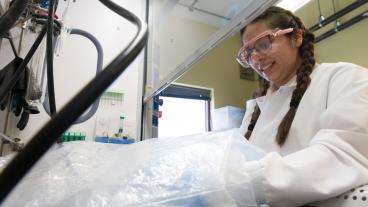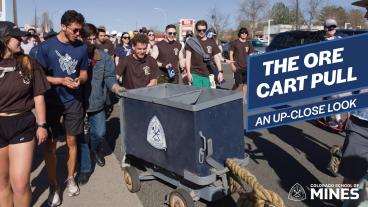A team of Mines computer science students engaged in a field session this summer that focused not only on advanced software engineering, but also on developing a product with a philanthropic mission.
The Giving Child Organization presented a challenge to the students: Develop a game app that appeals to children of all ages, increases awareness of world hunger and raises money for Heifer International.
“When I first read the description for this project, I knew I had to be on the team,” said Walter Schlosser, who will enter his senior year this fall with a double major in engineering physics and computer science. “The project matched perfectly with my interests and skills and I was excited to get to develop a game with a team of other skilled programmers.”
But as Schlosser noted, the project wasn’t just about making a game.
“Before this project, I would have felt that learning game design would be unrelated to helping the less fortunate. However, I loved the fact this project allowed me to use my talents to make a difference. It’s exciting to think of the endless creative ways people can help out.”
According to Asha Barnes, co-director of The Giving Child Organization, the object of the game “Aleksandra” (named for the protagonist of the game) is to herd animals to the market to make enough money to buy a book.
“Our object is to show children solutions to the struggles their peers around the world face,” said Barnes. “Our goal is to invite children into the world of giving in fun and meaningful ways. And right now, that means through games.”
The organization hopes to collaborate with WorldBuilders, a non-profit organization founded by New York Times Bestselling Author Patrick Rothfuss benefiting Heifer International, during its annual fundraiser and sell the game for $22.
“It’s expensive for a game, but the goal is to make a genuine difference, so $2 will go towards The Giving Child to fund the next game and $20 will go to Heifer International to buy a real live gaggle of geese for a family in need,” Barnes said.
“Aleksandra” is currently available for free in the Google Play store. It will officially launch in October.
Barnes said the Mines team was incredibly competent and far exceeded expectations.
“I don’t play games but I found myself skipping out on my responsibilities in order to finish this game,” said Barnes.
Daniel Victor, a computer science major also entering his senior year, said the project taught him a lot about teamwork.
“If you have a good team, it can make a project much easier. The skills and personalities in our team meshed well and made for a really enjoyable field session,” Victor said.
Ben Casey, who recently graduated from Mines with a degree in computer science and minor in economics, would like to see the game go viral.
“It’s a really cool app that is unlike any other on the Play store,” Casey said, noting he chose to work on this project because of the humanitarian mission behind it.
He also learned about seeing a project through from start to finish, delegating work and working with a client.
“The client had only a rough estimate of what they wanted, so this project taught me how to take an outline and implement it in a really cool way,” Casey said.
Cyndi Rader, electrical engineering and computer science teaching professor, coordinated the course and advised the team that developed the game, which also included Kelly Masuda.
Contact:
Karen Gilbert, Director of Public Relations, Colorado School of Mines / 303-273-3541 / kgilbert@mines.edu
Kathleen Morton, Communications Coordinator, Colorado School of Mines / 303-273-3088 / kmorton@mines.edu



